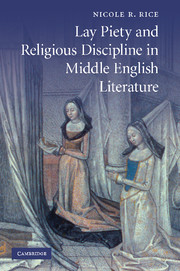Book contents
- Frontmatter
- Contents
- Preface
- Acknowledgments
- Abbreviations
- Introduction
- Chapter 1 Translations of the cloister: regulating spiritual aspiration
- Chapter 2 Dialogic form and clerical understanding
- Chapter 3 Lordship, pastoral care, and the order of charity
- Chapter 4 Clerical widows and the reform of preaching
- Conclusion: Spiritual guides in fifteenth-century books: cultural change and continuity
- Notes
- Bibliography
- Index
- CAMBRIDGE STUDIES IN MEDIEVAL LITERATURE
Chapter 2 - Dialogic form and clerical understanding
Published online by Cambridge University Press: 30 June 2009
- Frontmatter
- Contents
- Preface
- Acknowledgments
- Abbreviations
- Introduction
- Chapter 1 Translations of the cloister: regulating spiritual aspiration
- Chapter 2 Dialogic form and clerical understanding
- Chapter 3 Lordship, pastoral care, and the order of charity
- Chapter 4 Clerical widows and the reform of preaching
- Conclusion: Spiritual guides in fifteenth-century books: cultural change and continuity
- Notes
- Bibliography
- Index
- CAMBRIDGE STUDIES IN MEDIEVAL LITERATURE
Summary
LAITY AND CLERGY IN CONVERSATION
Catering to an expanding marketplace of spiritually inclined lay readers, The Abbey of the Holy Ghost and Fervor Amoris offer stabilizing literary forms designed to promote obedience to structures of clerical mediation and awareness of assigned religious and social degrees. In Piers Plowman, Passus 12, we find an argument for clerical intellectual and social privilege that would perhaps have found favor with the authors of those guides. Arguing for the need to respect clerks as the chosen conduits for God's wisdom and ultimately for salvation, Ymaginatif, Will's interlocutor, posits “clergie” as a quality to be shared secondhand by clerks with laymen, who should be subject to rather than participants in clerical intellectual discipline:
Ne countreplede clerkes, I counseille þee for euere.
For as a man may noƷt see þat mysseþ hise eiƷen,
Na moore kan no Clerk but if he cauƷte it first þoruƷ bokes.
AlþouƷ men made bokes [þe maister was god],
And seint Spirit þe Samplarie, & seide what men sholde write.
[And riƷt as siƷt serueþ a man to se þe heiƷe strete]
RiƷt so [lereþ] lettrure lewed men to Reson.
And as a blynd man in bataille bereþ wepne to fiƷte
And haþ noon hap wiþ his ax his enemy to hitte,
Na moore kan a kynde witted man, but clerkes hym teche,
Come for al his kynde wit to cristendom and be saued;
Which is þe cofre of cristes tresor, and clerkes kepe þe keyes
To vnloken it at hir likyng, and to þe lewed peple
Ʒyue mercy for hire mysdedes, if men it wole aske
Buxomliche and benigneliche and bidden it of grace.
- Type
- Chapter
- Information
- Publisher: Cambridge University PressPrint publication year: 2009



